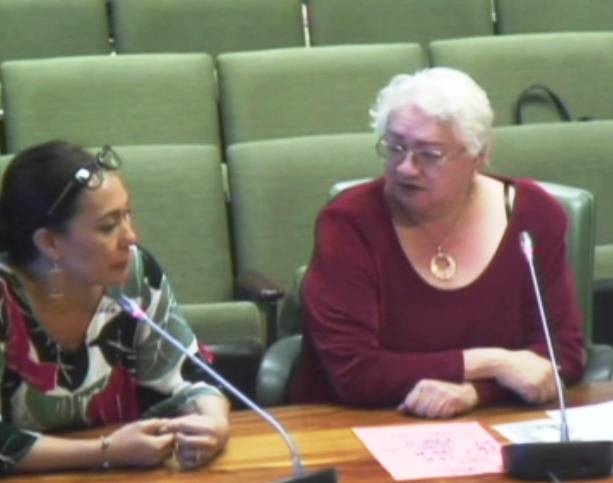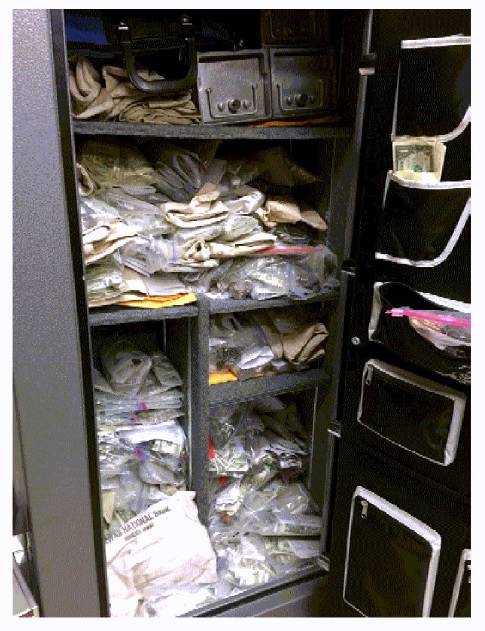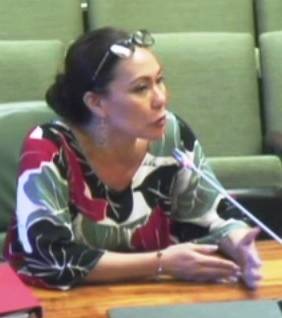Mass Transit mismanagement could hurt entire state’s federal funding



Almost $30,000 in uncounted cash and trip records sit in an unlocked safe in the breakroom at the Mass Transit Agency in January, 2018. (Photo courtesy Hawaii County Legislative Auditor)

HILO Millions of dollars in federal funding could be in jeopardy because the county Mass Transit Agency didnt submit its required paperwork for three of the past six years.
HILO — Millions of dollars in federal funding could be in jeopardy because the county Mass Transit Agency didn’t submit its required paperwork for three of the past six years.
That revelation Thursday by Mass Transit Administrator Brenda Carreira, in response to questioning by Puna Councilwoman Ashley Kierkiewicz, has county, state and federal officials scrambling to understand what went wrong and how to fix it.
“This is alarming,” said Hilo Councilwoman Sue Lee Loy. “Really, really alarming.”
If the problem isn’t resolved, not only could the county be barred from further federal grants, but it could be forced to pay some back. Furthermore, Hawaii County’s error could have ramifications for other Hawaii counties seeking federal money, Carreira said in response to questioning.
That bothered Council Chairman Aaron Chung, who doesn’t want to see Hawaii County’s problems hurt other counties’ transit projects.
“Does this misstep put not only us at jeopardy but the rest of the state?” he asked, receiving an affirmative response from Carreira. “That is not a good situation. … I’m sure the federal government will give us some leeway, and I don’t want to assume anything, but this is a really bad situation.”
Carreira didn’t bring up the federal grant problem Thursday during a lengthy, routine budget report to the council’s Finance Committee. Only after Kierkiewicz probed the grant funding issue did Carreira drop her bombshell.
Carreira said she recently received a phone call from the state Department of Transportation asking what’s going on.
“We just had this conversation, but my jaw kinda dropped,” Carreira said, adding, “We’re going to fix this.”
Officials from HDOT will be meeting with county staff Tuesday to try to figure out how to get the county into compliance.
“In advance of an anticipated audit from the Federal Transit Administration, HDOT is visiting the counties to conduct a test audit to ensure that the programs are ready for the FTA,” HDOT spokesman Tim Sakahara said in an email response.
“The test audit will include reviewing required agreements, reports, maintenance program documentation and safety program documents. We are starting on Hawaii Island,” he added. “At this time, no federal funds are in jeopardy.”
It’s not known how much money could be at stake. Carreira said the county lost out on funding for three years because the reports weren’t submitted. The agency anticipates getting $3.4 million for the budget year that starts July 1.
Carreira said the federal government is asking for records dating back to 2017, but, if there is an audit, it could go back further.
“We need to have it in a place where if we have an audit we can see it exactly,” she said. “I don’t want to lose funds, I don’t want to pay back funds, I don’t want to jeopardize the state. … But in an audit they could go back to previous years.”
U.S. Sen. Brian Schatz, D-Hawaii, has been trying to help, she said.
“Brian has been absolutely wonderful and actually, I believe he’s been protecting us,” Carreira said.
Schatz’s office was unable to provide a comment by press time Friday.
Carreira, the third administrator in a year, took over Oct. 1. She inherited an agency plagued by inconsistent bus schedules, broken buses, a drop in ridership, a county performance audit that blasted sloppy cash-handling practices and low employee morale.
One of the former administrators, Tiffany Kai, was in charge of managing the grants. She had stepped down as top administrator when problems began surfacing in 2017 and is now a program manager in the department.
Carreira and Kai said the agency was understaffed and at one point had only three people in the administrative office.
“We just didn’t have the capacity to do all of that,” Kai said. “I didn’t get the training I should have gotten. … I take full responsibility with what happened with our agency.”
The agency collects trip and mileage logs on papers filled out by Hele-On bus drivers. The numbers are supposed to be entered into a spreadsheet and reported to the FTA, under conditions spelled out by the government.
The Finance Department is loaning the Transit Agency extra workers to go through the mountains of paperwork to try to back-fill the required data.
“We physically have to go through each piece of paper,” Carreira said.
Finance Director Deanna Sako said she’d been unaware of the grant reporting problems at the Mass Transit Agency, although she knew the agency was struggling with record-keeping. She said agencies above a certain revenue level have their books audited regularly, while smaller agencies are “sprinkled in” on a less regular basis.
“I think we have the checklist, but we’re not making sure the boxes are getting checked,” Sako replied in response to questions about whether there are procedures in place to ensure grant requirements are followed.
Kierkiewicz said she hopes the administration will see the current problem as a place to streamline and coordinate its grant records-keeping processes.
“They’re public dollars and we need to be accountable for that,” she said. “There’s clearly a breakdown in the system.”


